Kathy Howard's Blog: Unshakeable Faith for Life, page 43
November 3, 2016
Fruit of the Spirit Week 5: The Walking Dead
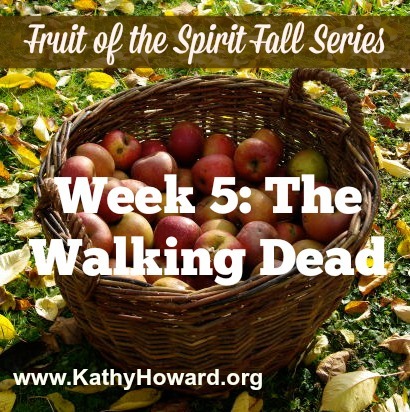

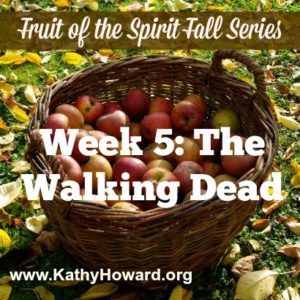 This post is the fifth lesson in a 6-week study series on the Fruit of the Spirit. (You can still access previous posts: Intro, One, Two, Three, or Four .) You can read today’s post and make notes in a journal or print the PDF version.
This post is the fifth lesson in a 6-week study series on the Fruit of the Spirit. (You can still access previous posts: Intro, One, Two, Three, or Four .) You can read today’s post and make notes in a journal or print the PDF version.
I know what you’re thinking. Images of horror movies and the undead have probably crept into your mind. Just for fun, I Googled “The Walking Dead,” the title of today’s lesson. Did you know there’s a TV series with the same name? This drama on AMC tells the story of a post-apocalyptic world ravaged by a zombie epidemic.
Thankfully, our fifth lesson in the “Fruit of the Spirit” has nothing to do with zombies. But we do need to talk about death – our own, in fact.
We Cannot Produce the Fruit of the Spirit
Here’s the truth of it: We cannot produce the fruit of the Spirit. We cannot – with any consistency – live a life characterized by love, joy, peace, patience, kindness, goodness, faithfulness, gentleness, or self-control.
You can’t produce the #FruitoftheSpirit
Click To Tweet
You may be able to muster up a loving act now and again. I might work up enough will-power to control my fleshly desires in one instance today. But our lives will never abundantly exhibit the characteristics of Christ by our own strength and works.
So just how can we live a life full of the Spirit’s fruit? Galatians 5:22-25 tells us:
But the fruit of the Spirit is love, joy, peace, forbearance, kindness, goodness, faithfulness, gentleness and self-control. Against such things there is no law. Those who belong to Christ Jesus have crucified the flesh with its passions and desires. Since we live by the Spirit, let us keep in step with the Spirit.
The #Bible doesn’t tell us to produce #FruitoftheSpirit
Click To Tweet
Nowhere in this passage does God tell us to produce the Fruit of the Spirit. But He does command us to do two things:
Crucify the flesh – Paul used the “active” voice in verse 24 when he wrote “have crucified the sinful nature.” This signifies an act that a believer has done and must continue to do to herself. We can choose to turn away from our sinful desires. Because of the presence of the Holy Spirit, we have the power to resist temptation and choose the way out God provides (1 Corinthians 10:13).
Keep in step with the Spirit – Since the Holy Spirit has given new life to our sin-dead souls, we are obligated to follow His lead. This is the second thing we are commanded to do in this passage. Depending on your translation, you may read “keep in step with,” “follow the Spirit’s leading,” or “let us walk by.”
Since “fruit” is the natural by-product of the Holy Spirit, only the Spirit can produce these characteristics in our lives. As we allow Him to take control, His life will be manifested in ours. (For more on “crucifying the flesh” and “following the Spirit” print this week’s PDF lesson.)
On my own, I would produce nothing but sinful works. Even my “good fruit” would be rotten. My flesh is too weak and sinful and to produce the characteristics of Christ. Kathy must “die.” I have to get out of the way and let the Holy Spirit live Christ’s life through me. It’s the appropriate response to the One who saved my life. And my eternal hope.
Let’s talk: What is the hardest thing for you about following the Spirit? What helps you submit to His leadership?
The post Fruit of the Spirit Week 5: The Walking Dead appeared first on Kathy Howard.
October 31, 2016
5 Reasons to Reboot Your Quiet Time
 Do you have a regular “quiet time?” You won’t find this term in the Bible, but Christians use it to refer to purposeful time spent alone with God. A time to hear from God and share your heart with Him. Jesus Himself set the example for us (Luke 5:16).
Do you have a regular “quiet time?” You won’t find this term in the Bible, but Christians use it to refer to purposeful time spent alone with God. A time to hear from God and share your heart with Him. Jesus Himself set the example for us (Luke 5:16).
I’ve heard – and made – many excuses for not setting aside time in the day to spend with God. Busyness is probably the biggest culprit. Yes, life can be overwhelmingly busy. But we have control over many of the items on our calendar. How we spend much of our time is our choice. We can choose God.
Some of you are in a season of life where you truly have very little time to yourself. Maybe you are a caregiver or the mother of young children. Many life circumstances make carving out space for a regular quiet time more difficult, but with a bit of creativity you can claim some time, even if it’s just a few moments here and there. (See this post for some examples.)
And some of us who were once devoted to our daily quiet time may have realized we slowly fell away from this spiritual discipline until it’s no longer our regular habit. An abbreviated day here and a missed day there, and the next thing we know…
Quiet Time Reboot Challenge
I’m going to be honest with you. For decades I’ve been very committed to regular time with God, but the last few months have been extremely challenging for me. I’ve been traveling a lot and my parents have been ill. And I’ve allowed those things to impact the quality of my quiet time.
Many Christians make establishing a regular quiet time a New Year’s resolution. January 1st is always a good time to get back on track. But often, by this time of year, many of us have let that resolution slowly fall by the wayside. But we don’t have to wait for the New Year. We can reboot our quiet time now!
#Reboot your #QuietTime Make a November 1st #resolution
Click To Tweet
Not sure you’re ready to get back on track? Maybe we need some incentive to make regular quiet time a priority. Let’s remind ourselves of a few of the benefits of spending time with God.
5 Reasons to Reboot Your Quiet Time
Spending regular time with God helps us know Him better, which fosters a deeper intimacy in our relationship.
Listening to God through His Word and prayer helps us better understand His will in general and discover His specific direction for our lives.
Time spent submitted and vulnerable before God gives Him an opportunity to accomplish His refining work in us.
Sitting in God’s presence enables us to more fully experience the comfort, encouragement, peace, and joy He longs to give us.
Purposeful time each day focused solely on God helps us keep our mind and heart on Him all day long.
5 reasons to #reboot your #quiettime
Click To Tweet
November 1st Reboot
No time like NOW to start fresh on a commitment to spend time with God. Will you join me for a November 1st resolution? Let’s make a fresh commitment to regularly spend time with God and end 2016 with a spiritual bang instead of a whimper. Here are a couple of things you may find helpful in establishing or re-establishing a regular quiet time:
11 Tips for Spending Quality Time with God
5 Bible Reading Plans
5 Probing Questions to Meditate on Scripture
Paul’s Life and Writings (A 10-week Bible study plan)
So… will you reboot with me? I’d love to hear from you about how your quiet time is going right now… if you need a reboot and why… and if you’ll reboot with me!
The post 5 Reasons to Reboot Your Quiet Time appeared first on Kathy Howard.
October 27, 2016
Fruit of the Spirit Week 4: Throw out the Bad Fruit
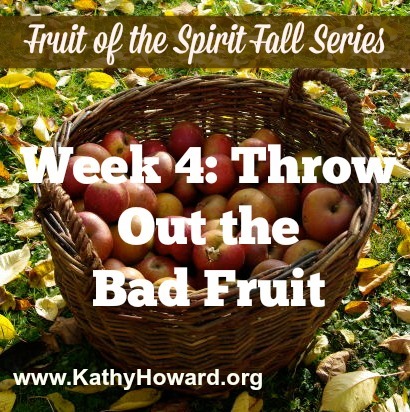

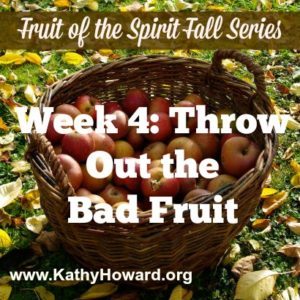 This post is the fourth lesson in a 6-week study series on the Fruit of the Spirit. (You can still access previous posts: Intro, One, Two, or Three.) You can read today’s post and make notes in a journal or print the PDF version!
This post is the fourth lesson in a 6-week study series on the Fruit of the Spirit. (You can still access previous posts: Intro, One, Two, or Three.) You can read today’s post and make notes in a journal or print the PDF version!
If you’ve had any experience with a GPS or use a navigation system for driving directions then you are familiar with the following phrases:
Recalculating
Make a legal u-turn as soon as possible
My anxiety level rises dramatically when I hear that little computerized voice. In layman’s terms, “recalculating” means “You aren’t following my directions!” And the command to make a u-turn means, “You’re going the wrong way! Turn around immediately and go the other way!”
Plant: What does fleshly fruit look like?
Like these GPS warnings to drivers, there are certain things that should raise a red flag in our faith if they are present in our lives. In Galatians, Paul refers to these signs as “acts of the sinful nature.” These attitudes and behaviors are contrary to the Spirit and what He wants to produce in our lives.
Read Galatians 5:19-21 from the New Living Translation below.
19 When you follow the desires of your sinful nature, the results are very clear: sexual immorality, impurity, lustful pleasures, 20 idolatry, sorcery, hostility, quarreling, jealousy, outbursts of anger, selfish ambition, dissension, division, 21 envy, drunkenness, wild parties, and other sins like these. Let me tell you again, as I have before, that anyone living that sort of life will not inherit the Kingdom of God. Galatians 5:19-21, NLT
Grow: Is our life growing any fruit of the flesh?
Note any fruit of the sinful nature in the passage above that sometimes pop up in your life.
This list in Galatians is not exhaustive. Paul merely gave the believers in Galatia a sample of the fruit of the flesh. And everyone will struggle with different things. Let’s read two more passages from Paul’s letters to broaden our understanding of “the acts of the sinful nature.”
Read Ephesians 4:22-32, Ephesians 5:1-7, and Colossians 3:5-10 in a couple of different translations. What attitudes or behaviors listed in these passages does your sinful nature tend to produce?
The presence of these attitudes and behaviors reveal that sometimes we allow our sinful nature to win a spiritual battle. If you’re like most Christians – including me – your life does produce some fleshly fruit from time to time. We still occasionally choose our own way over God’s and reject the “way out” He promises to provide when we’re tempted (1 Corinthians 10:13).
Toss out the #BadFruit #FruitoftheSpirit
Click To Tweet
Plant: What can we do to get rid of the bad fruit?
Believer, whether our lives have produced a handful of fleshly fruit or an abundant crop, God’s desire for us is less “acts of the sinful nature” and more “fruit of the Spirit.” In the remainder of this lesson we are going to prepare our lives for the Spirit’s harvest by weeding out the bad fruit and tilling our heart for the Spirit’s work.
Weeding & tilling prepare our lives for a spiritual harvest #FruitOfTheSpirit
Click To Tweet
Jesus’ brother James wrote to Christians caught in a cycle of producing fleshly fruit. They had proudly rejected the leadership of the Spirit and chosen their own way. Distance from God, difficult relationships with God’s people, and a harvest of fleshly fruit were the result. But James commanded a remedy. I can hear him saying, “Make a legal u-turn as soon as possible!”
Read James 4:1-10. What phrases and words so you see in verses 1-4 describe their relationship with God and other believers? Now read back through verses 6-10 and look for all the verbs that describe the actions a Christian should take when we’ve chosen our own way over God’s (I spotted 10).
These actions characterize true repentance. Sometimes Christians merely give lip service to repentance. But until we humble ourselves before God, grieve over our sin, and turn away from it we have not experienced real repentance. We must make a u-turn!
Read 1 John 1:9 to discover how God promises to respond to our repentance.
Today’s lesson has been very personal – and maybe even painful. We all have bad fruit in our lives. But, praise God, He does indeed allow u-turns! Take some time this week to sit quietly with God and work through getting rid of the fleshly fruit. In the meantime, let’s talk more about the process of repentance:
Was there anything in James 4:6-10 about repentance that surprised you? Maybe an attitude God calls us to adopt or an action you previously have not considered part of repentance.
The post Fruit of the Spirit Week 4: Throw out the Bad Fruit appeared first on Kathy Howard.
October 24, 2016
Family Recipe: Chicken and Dumplings


 I just completed a fun project. I used Shutterfly to create a memory cookbook for our grown children. The book includes photos of my husband’s parents and his mom’s recipes we all loved most. I ordered 5 books. One for me, one for each of our grown kids, and one for Wayne’s nephew.
I just completed a fun project. I used Shutterfly to create a memory cookbook for our grown children. The book includes photos of my husband’s parents and his mom’s recipes we all loved most. I ordered 5 books. One for me, one for each of our grown kids, and one for Wayne’s nephew.
The idea for the project took root early this past summer. Wayne’s dad passed away in March and we were going through his things. We found two small boxes containing all of Wayne’s mom’s handwritten recipes. Wayne’s mom – we called her Mammaw – was a wonderful grandmother and a great country cook. She also taught first grade for 34 years. I learned a lot from her about parenting and cooking.
Sadly, Wayne is now the last of his nuclear family. Cancer claimed his brother in 1994. Mammaw died in a car accident in 2004. And we lost “Pappaw,” Wayne’s dad, this spring. The memory cookbook seemed like a nice keepsake for the grandchildren.

Howard Family 1993
So, since I’ve been focused on recipes the last few days, you all get to benefit. My favorite “Mammaw recipe” is her Chicken and Dumplings. Since the dumplings are made from scratch, it’s a bit time-consuming. But it’s totally worth it!
The recipe is below, but you can also print this PDF!
Chicken and Dumplings
Ingredients:
1 whole chicken
4 cups flour
1 tsp salt
1 ½ cups boiling water
1 stick butter
2 cans cream of chicken soup
Salt and pepper
Cook chicken in large pot of water until done. Remove chicken from pot and reserve broth. When chicken is cool enough to handle remove skin and bones. Cut or tear chicken into bite-sized pieces. Set meat aside.
Add enough water to broth to make two quarts of liquid. Bring to a boil. Meanwhile, prepare dumplings. Mix flour and salt. Blend in butter. Add boiling water. Roll dough out thin and cut into short strips. Drop dumplings into boiling broth and simmer until done. Add chicken, soup, and salt and pepper to taste. Serves 8 to 10.
If you make it, I’d love to hear how it turns out and how your family likes it! What is your favorite fall recipe??
The post Family Recipe: Chicken and Dumplings appeared first on Kathy Howard.
October 20, 2016
Fruit of the Spirit Week 3: The Battle Within
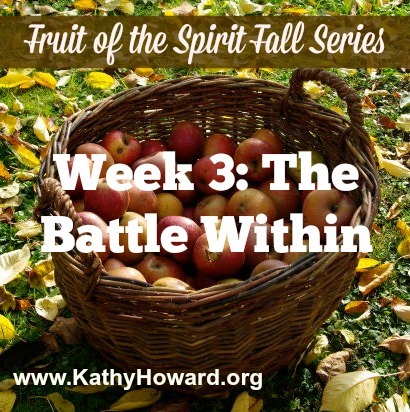

 This post is the third lesson in a 6-week study series on the Fruit of the Spirit. (You can still access previous posts: Intro, One, or Two.) You can read today’s post and make notes in a journal or print the PDF version!
This post is the third lesson in a 6-week study series on the Fruit of the Spirit. (You can still access previous posts: Intro, One, or Two.) You can read today’s post and make notes in a journal or print the PDF version!
I fought this particular battle many times. And I’ve watched many other moms fight it too. It happens every day in grocery checkout lines all over the world. The preschooler wants candy. The mom does not want the preschooler to have candy. And so the battle begins.
The preschoolers fight with every weapon in their arsenal – tears, pleadings, promises of good behavior, and even temper tantrums. Moms draw the line to defend healthy teeth and a nutritious diet. Who will win?
Sometimes the mom wins. Sometimes the kid wins. The outcome depends on willpower and determination. The kids have an advantage because they don’t care how many people stare and whisper. They value the candy much more than their self-respect. Sometimes the battle-weary mom just wants to get out of the store alive, even if that means giving in. At least she will live to fight another day.
The candy battle in the checkout line is a minor skirmish compared to the spiritual battle going on inside every Christian. Our sinful human nature wants to satisfy our selfish desires. The indwelling Holy Spirit calls us to follow Him. Who will win?
#Christians fight a daily #battle. Who will win?
Click To Tweet
Plant: The two sides in this spiritual battle
Read Galatians 5:16-18 for a description of our spiritual battle.
Let’s identify the sides in this battle. Paul says the Spirit wants one thing and the sinful nature (some translations use flesh) wants another. The Greek word pneuma, translated as “Spirit,” can also be translated as “breath” or “wind.” Like the wind, the Holy Spirit is an unseen but “powerful force with visible effects” (Mounce’s Complete Expository Dictionary). “Sinful nature” or “flesh” is the Greek word sarx. Although this word primarily referred to the physical body, Christians also used it to describe our fallen, sinful nature. The Expositor’s Bible Commentary describes this usage: “Sarx came to mean all the evil that man is and is capable of apart from the intervention of God’s grace in his life.”
Cultivate: Greater is He that is in us
Read Ephesians 1:18-21. Reflect on the power of the Holy Spirit that lives within you.
Unfortunately, our sinful nature still exists. But praise God, we have a weapon of unlimited power on our side. The same power that raised Christ from the dead lives inside every believer! We have the power to resist our fleshly desires through the presence of the indwelling Holy Spirit. “The one who is in you, is greater than the one who is in the world” (1 John 4:4, NIV).
The Holy Spirit does not immunize us against temptation – rather, He enables us to withstand temptation. He imparts to us the ability to turn away from all things that are contrary to God’s plan and purpose for our lives. Charles Stanley, Living in the Power of the Holy Spirit
Read 2 Peter 1:3-4 and 1 Corinthians 10:13. Contemplate God’s promises to you.
Grow: Follow the Spirit
We do not have to give in to sin. Our fleshly nature does not have to win. Jesus’ death and resurrection broke Satan’s death grip on us. Satan can appeal to our sinful desires, but his power over us is limited. We have a greater power at work in us.
Satan’s power over Christians is limited. We have a greater power within
Click To Tweet
Look back at Galatians 5:16-19. We have a choice to make. What is it?
We can choose to refuse our sinful nature. The powerful presence of the Holy Spirit supplies us with the power to be obedient to God. We can choose God’s “way out.” The question is: will we succumb to the call of our flesh or will we yield to the Holy Spirit and walk in His power?
Let’s talk: Think about the last time you faced a spiritual battle. What was it? Did you allow your flesh to win or did you walk in the power of the Holy Spirit? If you gave in to sin, can you identify the “way out” God offered?
The post Fruit of the Spirit Week 3: The Battle Within appeared first on Kathy Howard.
October 17, 2016
Are Christians Obligated to Vote on November 8th?


 The upcoming Presidential election creates a major dilemma for many Christians. Here’s the basis for our dilemma: Neither major party candidate exemplifies even the most basic Christian ethics and standards. Neither is worthy of the office of the President of the United States of America.
The upcoming Presidential election creates a major dilemma for many Christians. Here’s the basis for our dilemma: Neither major party candidate exemplifies even the most basic Christian ethics and standards. Neither is worthy of the office of the President of the United States of America.
Some Christians believe the best course of action is to abstain from voting on November 8. Others feel they should cast their vote for the “lesser of two evils.” (Check out this helpful article by Russell Moore, “Should Christians Vote for the Lesser of Two Evils?“) Which action is the right response? Could there perhaps be another option?
Are Christians obligated to vote in the Nov8 #PresidentialElection?
Click To Tweet
Let’s take a step back and briefly lay a biblical foundation for government and our responsibility as citizens.
First, God holds complete sovereignty in establishing, upholding, and removing all nations, rulers, and authorities (Daniel 2:21, Daniel 4:17, Acts 17:26, Romans 13:1). He established government for our good, to suppress evil, and to prevent chaos. Government at all levels provides structure for the country and service to the people (Romans 13:1-7).
3 Principles for a Christian’s Relationship to Government
Click To Tweet
The Bible also establishes principles for a believer’s relationship to government:
Intercede Faithfully – God commands us to support the government and our leaders with our prayers. In fact, regular intercession for everyone pleases God (1 Timothy 2:1-4).
Submit Respectfully – Christians should obey the laws of our land and submit ourselves to the authority of our leaders. Paul goes as far as saying that rebelling against our government authorities is the same as rebelling against God. The Bible even says we should submit with a good attitude! (See Romans 13:1-2, Titus 3:1-3, 1 Peter 2:13-17.)
Fulfill Responsibilities – Believers are now and eternally citizens of the Kingdom of God. But while we still live in this world, we are also citizens of an earthly kingdom. As citizens, we have rights to enjoy and responsibilities to fulfill. More than once, Paul exercised his rights as a Roman citizen (Acts 21:25-29, Acts 25:10-12). Jesus not only taught we should fulfill all our obligations to the government, He set the example (Matthew 17:24-26, Matthew 22:15-22). Note: Yes, government is subject to corruption because it is comprised of sinful men. And when forced to choose, we must always obey God rather than man (Acts 4:19, Acts 5:29). However this election doesn’t take us there.
How should these biblical principles impact my vote?
So, how do these principles apply to the upcoming presidential election? The United States of America is a republic. Citizens have the right and responsibility to elect the government officials who will represent us.
But this go around, that responsibility seems much heavier. I am struggling with this myself. I am praying and thinking about the right thing to do. I understand why many have decided to simply not vote at all. Yet, that won’t prevent a new president from being inaugurated in January. That won’t fulfill my responsibility as a citizen of the United States.
There is another option. One I am contemplating. We can fulfill our responsibility as citizens and not vote for either of “them.” There will be other candidates on the ballot. Or we could cast a write-in vote. Yes, we can exercise our right and vote our conscious.
Without bashing or endorsing any candidate, how are you dealing with this weighty responsibility?
Find out who is else will be on the ballot:
Presidential Candidates
Ballotpedia
The post Are Christians Obligated to Vote on November 8th? appeared first on Kathy Howard.
October 13, 2016
Fruit of the Spirit Week 2: What is “Fruit?”
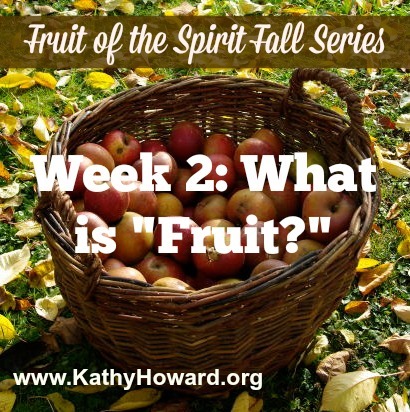


This post is the second lesson in a 6-week study series on the Fruit of the Spirit. (See the intro post here or the first week here.) You can read today’s post and make notes in a journal or print the PDF version!
When my kids were little they loved watching Veggie Tales. Their favorite Veggie Tale characters were Bob and Larry – a tomato and cucumber, respectively. If you are also a Veggie Tales fan, you might want to sit down because I am about to shake things up. Larry and Bob aren’t vegetables! To be botanically correct, tomatoes and cucumbers are fruits!
It really doesn’t matter if we consider a tomato to be a fruit or a vegetable. But we do need a good understanding of the “fruit of the Spirit.” Over the next few weeks we will plant God’s truth about spiritual fruit in our hearts, cultivate our lives to receive it, and take action to help it grow! Today we’ll take a closer look at what the “fruit of the Spirit” is and what it is not.
Week 2 of #FruitoftheSpirit Series. What is “fruit?”
Click To Tweet
Read our focal passage, Galatians 5:16-26.
The word “fruit” used in Galatians 5:22 is the Greek word “karpos.” According to Mounces Complete Expository Dictionary, “karpos” refers to the natural product of something that is alive. Literally, it’s used of the product of trees, vines, and crops. But it’s also used metaphorically to refer to the natural product of a spiritual being. Paul uses it to contrast what our sinful natures naturally produce with what the Holy Spirit naturally produces.
Plant: Prerequisite to Growing Spiritual Fruit
The obvious prerequisite to producing the “fruit of the Spirit” is the presence of the Spirit. Let’s see what the Bible says about the indwelling presence of the Holy Spirit and His work in us.
Read Romans 8:9-11. Which of the following statements are True? Which are false?
___ You can be a Christian without having the Holy Spirit.
___ If you do not have the Spirit you do not belong to Christ.
___ If you belong to Christ then you have His Spirit.
Read Ephesians 1:13-14. Which of the following statements are true?
___ We receive the Holy Spirit through faith in Christ.
___ The Holy Spirit “marks” us as belonging to God.
___ The Spirit is our “guarantee” that we will receive all God’s promises.
At one time, we were all spiritually dead in our sins (Ephesians 2:1). We could do nothing to save ourselves. But in God’s great kindness and mercy, He sent His Son to pay the penalty our sins deserve (Romans 6:23). Jesus’ death on the cross makes our salvation possible. We cross over from death to life by God’s grace, through faith in Christ and spiritual regeneration by the Holy Spirit (Titus 3:3-7). The indwelling presence of God’s Spirit guarantees our eternal salvation (Ephesians 1:13-14). (If you don’t have a saving relationship with Jesus or aren’t sure, read “How to Have a Relationship with Jesus.”)
Cultivate: Two Key Facts about the Fruit of the Spirit
Let’s get a better understanding of the Fruit of the Spirit by exploring two key facts.
Fact #1: “Fruit” is the natural by-product of the Spirit in a Christian’s life.
Read 2 Corinthians 3:17-18 from the New Living Translation below:
7 For the Lord is the Spirit, and wherever the Spirit of the Lord is, there is freedom. 18 So all of us who have had that veil removed can see and reflect the glory of the Lord. And the Lord—who is the Spirit—makes us more and more like him as we are changed into his glorious image.
The Spirit has work to do in the life of a believer. According to 2 Corinthians 3:18, what is the work of the Spirit in our lives?
From the moment of salvation until the end of our lives on this earth, the Spirit of God works in believers to transform our nature and character into that of Christ’s. God’s goal for all His children is for us to be like Jesus (Romans 8:29). Therefore, the Holy Spirit is constantly working to rid our lives of the “acts of the sinful nature” (Galatians 5:19) and conform us into the image of Christ. “Fruit of the Spirit” is evidence that our character is becoming like Christ’s.
Fact #2: “Fruit of the Spirit” is not the same as “spiritual gifts.”
We’ve learned that “fruit of the Spirit” is the development of Christ’s character in the life of a believer. Now let’s take a look at what this “fruit” is not.
#FruitoftheSpirit What it is and what it is not
Click To Tweet
Read 1 Corinthians 12:4-11.
Although the Spirit is the source of both, His “gifts” and “fruit” are not the same. There are a multitude of different kinds of gifts but an individual only receives what the Holy Spirit determines to give. However the “fruit” of the Spirit should be common to all Christians. The word “karpos” is singular signifying that “fruit” is a unified whole. As we grow in Christ-likeness we will produce all the characteristics of His nature.
Grow: A Challenge to Know the Fruit
I want my life to increasingly produce the “Fruit of the Spirit.” How about you? As a solid reminder of what our lives should look like, will you join me in memorizing Galatians 5:22-23? Let’s do it?
Let’s talk. Will you take the Scripture memory challenge? How has today’s lesson helped you understand the “Fruit of the Spirit?” What stood out to you the most in what we discussed?
The post Fruit of the Spirit Week 2: What is “Fruit?” appeared first on Kathy Howard.
October 10, 2016
Perfect for Fall: Cheeseburger Soup
 The air is crisp in Houston today with the early morning temperature in the upper 50’s. Finally, it feels like fall.
The air is crisp in Houston today with the early morning temperature in the upper 50’s. Finally, it feels like fall.
Fall brings many wonderful things, including soup. So, I decided this was a perfect day to break from my usual kind of blogging and share one of my favorite soup recipes with you – Cheeseburger Soup!
I found the original recipe in a “Taste of Home” magazine about 25 years ago. (Yes, that’s when I still got printed magazines delivered through the mail.) But I have adjusted it here and there to make it my own.
The whole family loves it. My kids even loved it when they were young, so chances are it will please your family too, no matter their ages. The recipe is below, but here’s a PDF you can print!
If you make it, I’d love to hear back from you on how it turns out!
#SoupRecipe #CheeseburgerSoup
Click To Tweet
Cheeseburger Soup
½ pound ground beef
¾ cup chopped onions
¾ cup shredded carrots
¾ cup diced celery
1 tsp dried basil
3 Tbl butter
3 cups chicken broth
4 cups peeled, cubed potatoes
¼ cup all-purpose flour
8 ounces Velveeta, cubed
1 ½ cups milk
¾ tsp salt
½ tsp pepper
¼ cup sour cream
Brown the beef in a 5-quart pot. As the beef is browning, add the onions, carrots, celery, and basil to the pan and sauté all together. When beef is no longer pink and the veggies soft, add chicken broth and potatoes to the pot. Bring to a boil. Reduce heat, then cover and simmer until potatoes are tender, about 10-12 minutes. Meanwhile, melt butter in a small skillet. Add flour, cook and stir for 3-5 minutes or until mixture is bubbly. Add flour mixture to soup and stir until thoroughly mixed. Bring soup to a boil. Cook and stir for 2 minutes. Add cheese, milk, salt, and pepper. Cook and stir until cheese melts. Slowly add a small amount of the hot soup liquid to the sour cream and stir until smooth. Then stir sour cream mixture back into the soup. Makes 8 servings.
The post Perfect for Fall: Cheeseburger Soup appeared first on Kathy Howard.
October 6, 2016
Fruit of the Spirit Week 1: The Proper Climate
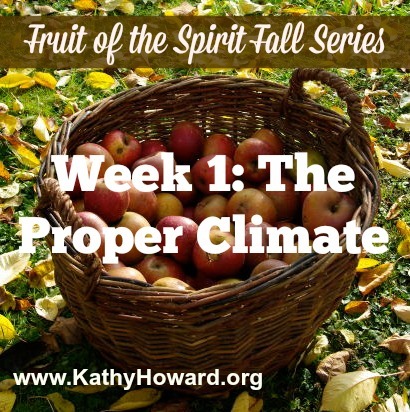

 This post is the first lesson in a 6-week study series on the Fruit of the Spirit. (See the intro post here.) You can read the post and make notes in a journal or print the PDF version!
This post is the first lesson in a 6-week study series on the Fruit of the Spirit. (See the intro post here.) You can read the post and make notes in a journal or print the PDF version!
Like knowing the climate is key for producing a fruitful harvest, knowing the context is key for understanding a given situation. Consider this example:
“Stop! You’re killing me!”
Which of the following scenes produced the statement above?
A teenage boy won’t stop tickling his little sister.
A middle-aged woman just scored 75 points against her Scrabble partner.
A masked man is beating a defenseless elderly woman.
Does it matter? Absolutely! In the first two cases, the statement is meant to be teasing and playful. But the last scenario is life and death! We must know the context of the statement to know if we should laugh or call 911.
Likewise, before we can understand and apply Galatians 5:16-26, our primary study passage, we must know its context. Too often, we misunderstand and misuse God’s Word because we attempt to interpret a verse or passage apart from the whole.
The way God chooses to apply the truths found in His Word can vary with the individual and their circumstance. However the meaning of a biblical passage never changes. It will always mean what God originally intended for it to mean. Before we can make application to our lives we must have a good grasp of the original meaning by considering the larger context. (For more information on biblical context read “4 Things to Consider for Biblical Context.”)
The Context of Galatians
Galatians is a letter written to a specific people at a specific point in history for a specific purpose. Therefore, we need to know who, when, and why to understand the meaning.
Read Galatians 1:1-9, watching for information on the following:
Author of this letter
Recipients of this letter
Purpose of this letter
Many of you are probably familiar with Paul’s background and dramatic conversion. If not, you can get a good overview by reading the personal account of his story in Acts 22:1-21. A couple of pertinent facts about Paul is: 1) he was raised a zealous Jew thoroughly trained in the law; and 2) when Christ saved Paul, God called him to take the Gospel to the Gentiles.
The recipients of Paul’s letter – the churches in Galatia – were comprised of mostly Gentile Christians who had been saved out of paganism. They had received Christ and the Holy Spirit by faith and had never observed the Jewish Law.
Purpose of Galatians
Understanding why Paul wrote to the Galatians will help us understand the “Fruit of the Spirit” and how it’s produced in our lives. Paul was concerned about false teaching in the churches, a “different gospel” which he refers to in Galatians 1:6.
Jewish Christians, who still held to the Law of Moses, had infiltrated these Gentile believers and falsely taught that they must observe the Jewish law to be Christians. These “Judaizers” were concerned that faith without the discipline of the law would lead to immorality, but their teaching had only minimized God’s grace and created a warped form of “Christianity.”
Paul, recognizing the danger, wrote to remind the Galatians of the truth of the Gospel message and to protect them from this false teaching. The letter emphasizes God’s grace while upholding God’s call to righteousness by living a life following the Spirit.
Read Galatians 5:1-12. Based on the passage and what we learned above list all the negative consequences of trying to live by the law.
Read Galatians 5:13-15. In addition to the Judaizers’ legalism, what other problem within these Gentile churches did Paul address?
Apparently the Galatians were using their “freedom” as an excuse to follow their sinful desires and they were hurting their fellow believers in the process. Paul longed for the Galatians to experience the freedom and unity only found in Christ while living a holy life that pleased God. That is also our goal! But freedom cannot be found in observing the Law. And indulging our sinful nature will never produce the righteous life God desires. What is the answer?
Read Galatians 5:16-26, our focal passage for this study. How can we find both freedom and righteous in Christ? (Check one)
___ Live however we want as long as it doesn’t hurt someone else.
___ Follow the law as closely as possible.
___ Live life submitted to the Holy Spirit, following His leading.
Today we laid the foundation for our study. (Print the PDF version.) Next week we will dig into the meaning of “fruit of the Spirit.” In the meantime, let’s talk:
So far in your Christian life do you feel you have been influenced more by the “law,” your own nature, or by the Spirit? (We may not have the influence of the Mosaic Law, but the “do’s” and “don’ts” or religion are still prominent.)
The post Fruit of the Spirit Week 1: The Proper Climate appeared first on Kathy Howard.
October 3, 2016
4 Cautions Before Choosing a Life Verse


My name is Kathy and I don’t have a life verse. And I feel like I just might be the only Christian on the planet who doesn’t.
What is a “life verse?”
According to the Dictionary of Christianese, a “life verse” is a “specific Bible verse that a Christian believes to be specially representative or predictive of his or her life. Many Christians regard their life verse as an inspirational motto or lifelong mission statement.”
Why do people choose a life verse?
 Honestly, I’m really not sure. As far as Christian history goes, it’s a fairly recent practice – like in just the last 100 years. As far as I have been able to determine, there is no biblical principle to support choosing a life verse. That doesn’t necessarily mean it’s wrong, or a bad thing to do, but it could be more trendy than spiritual.
Honestly, I’m really not sure. As far as Christian history goes, it’s a fairly recent practice – like in just the last 100 years. As far as I have been able to determine, there is no biblical principle to support choosing a life verse. That doesn’t necessarily mean it’s wrong, or a bad thing to do, but it could be more trendy than spiritual.
If you’re considering choosing a life verse, you can get all kinds of help online. For instance, you can learn how to find your life verse. Then if you’re still having trouble narrowing the more than 31,000 down to just one, here are 20 suggestions! Still at a loss? You can take this quiz to determine what yours should be! But the article I like the most was this sarcastic one on “Stuff Christians Like.”
#LifeVerse Are they more #trendy than #Spiritual?
Click To Tweet
Right now I don’t see a need to choose one verse that defines, directs, or represents my life. However, that doesn’t mean concentrating on a specific verse or passage for a period of time is a bad thing. But I do think you should proceed with caution.
#LifeVerse Proceed with caution. 4 things to consider
Click To Tweet
4 Things to Consider Before Choosing a Life Verse
All Scripture is God-breathed and useful for our lives (2 Timothy 3:16-17, Hebrews 4:12-13) – Yes, some verses and passages have greater impact at certain times in our lives. For instance, if we are in a season of grief and loss we may want to memorize verses about God’s comfort and peace. But God’s Word has value for all things – the whole Word of God, not just a piece. Why would we even attempt to narrow it down to one verse!
One verse or passage can easily be misapplied – We cannot correctly understand one verse apart from its context in the greater passage. Pulling one out on its own can be dangerous. For instance, in the list of 20 life verses mentioned above, Philippians 4:13 was at the top of their list. “I can do everything through Him who gives me strength.” Sounds good, doesn’t it? I see it on t-shirts, coffee mugs, and wall plagues all the time. But I imagine most people take this verse out of context. When we read the larger passage, we discover that Paul was writing about finding contentment even in the most dire of circumstances. Yet we often claim this verse as a promise that God will empower us to tackle any big task or great thing we want to take on.
Only God knows the future – It seems if we take this life verse thing really seriously that we just could get the cart before the horse. What I mean is this – if we choose one verse as a statement for our life, we could easily fall into choosing a verse that reflects our life rather than working to make our life reflect God’s Word.
It’s easy to make ourselves the focus – Often choosing a life verse seems to be a lot about “me,” and not so much God. Many times, it’s about what makes us feel good or reflects what we want to do for God.
Yes, there are times when I’ve spent days or weeks or more focusing on one passage of Scripture. There are specific verses I hold dear because God has used them to teach me something huge or impact me in a significant way. And I fully expect that to continue. But for now, there’s no “life verse” for me.
Would love for you to chime in. “Yes” or “no” to a life verse and why!
The post 4 Cautions Before Choosing a Life Verse appeared first on Kathy Howard.



